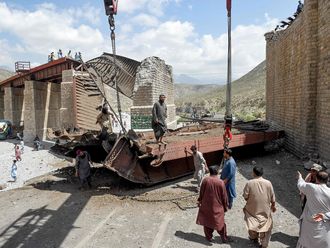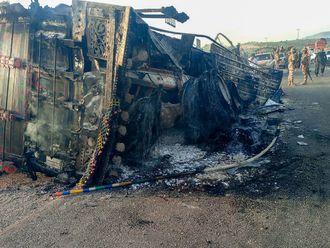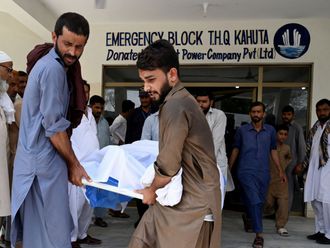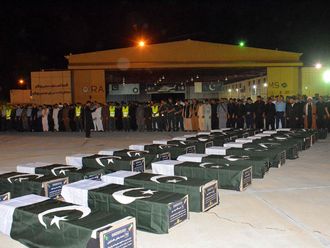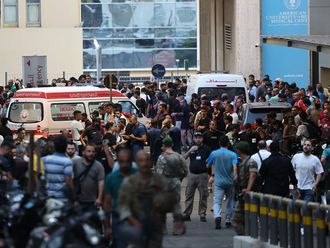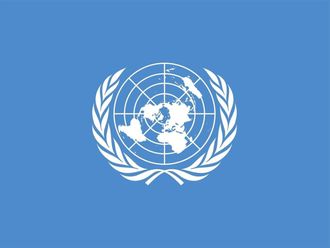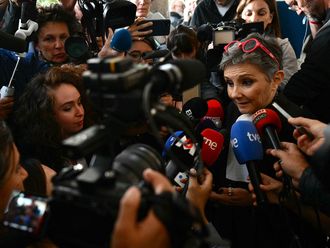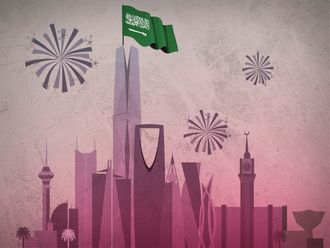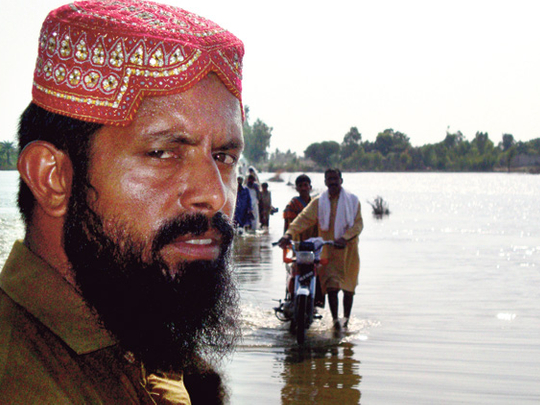
Mahmood Kot: The floodwaters have receded and so have hopes in the wake of political rhetoric of reconstruction in this aptly named hamlet Ghareeb Abad (meaning: abode of the poor), surrounded by three power plants, an oil refinery and a petroleum storage depot in Muzafargarh district.
In early August, Gulf News travelled with flood displaced people from Multan in a special train to Mahmood Kot, where raging water from a canal embankment breach became an unbeatable barricade.
Hafiz Mahmoud-ul-Hassan, a foreman in a government office, had to return back to the camp set up in a school where his five children and wife shared a dormitory with 20 others. Three months later, Hassan's struggle for shelter remains endless.
He lives in walled compound, devoid of any room or wooden shelter. Hassan and his disabled brother's extended family of 17 individuals, cooks and sleeps on cots in almost zero degree Celsius temperature of December nights.
"Not just us but families in the entire village sleep close to each other in same bed to stay warm for there are far less blankets to protect us," he told this reporter.
Hassan's wife was trying to stitch a mosaic sheet with different patches of left over piece of cloth scavenged from the debris of their home.
In one corner, a heap of cotton lies to be dried up in day light.
"This may smell bad for you but we are going to make new quilts stuffed with this flood-water soaked cotton," he said.
Hassan, who serves as a peon in Punjab province's Social Security Department, was lucky to get Dh815 as salary for the two months he had spent in camps during the floods.
Unlike many in the village, he also received Dh858 through the Watan Cards Scheme, an initial installment of government aid for the flood victims.
Officials admit that some 30 per cent of the flood victims have yet to be issued Watan cards.
With such meagre resources and relatively better luck, Hassan faces the challenge of supporting two families.
Glasgow village
In Hassan father's courtyard, men of the family, most of whom don't get any labour work these days, have completed two rooms and a five-foot gallery sponsored by Mohammad Sarwar, an MP from Glasgow who has Pakistani roots.
The modest twin room block makes winter a lot more bearable than living in the open.
Residents of Ghareeb Abad, now been renamed as Glasgow village, are to get some 100 small housing units built with British donations. The hamlet is dotted with all-weather shelters assembled by the Turkish Red Crescent.
Hassan's sister-in-law Asma Niaz has given birth to a baby girl, Shamaa, only last week in a tent.
"Indeed it was the most painful deliveries of all the seven I have had," she says in her local Siraiki language. Her face and hands are pale.
An older woman of the family said: "She had lost lots of blood during delivery and no specialised medical help was available."
Prior to the floods, Asma would have been giving birth in almost similar conditions with the exception of having a traditional midwife to assist her.
Next door, Hassan's in laws sleep in tents too. The British NGO is donating only one room for 19 members of the extended family.
Hassan's mother-in-law runs a small shop, selling toys and sweets. Children roam around naked, with running noses and torn lips.
Gulf News found a drug store 10km from Ghareeb Abad but medicines are as much in demand as wheat, sugar and pulses.
A month after the water receded, food rationing was discontinued, residents say.


